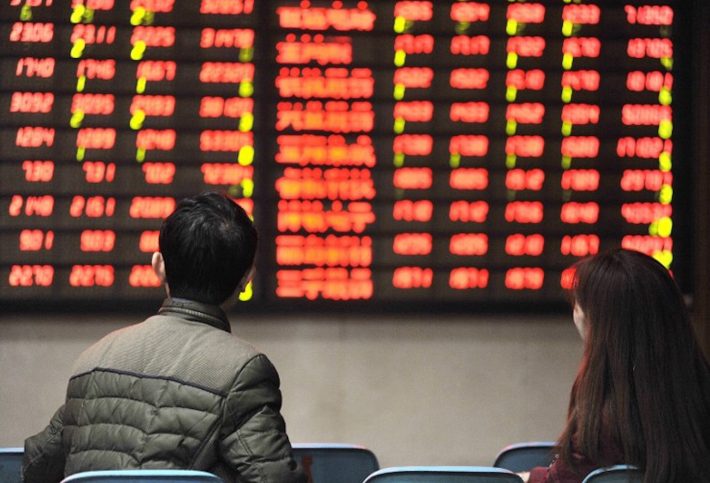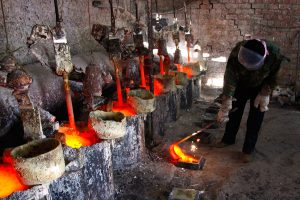• Hang Seng Index has now given up more than 10% in three trading days
• Tutoring and tech sectors targeted by Beijing – Tencent and Alibaba tumble
Hong Kong shares plunged more than 5% on Tuesday, extending the previous day’s hefty losses, as China’s regulatory crackdown took its toll on a range of industries including private education and technology.
The Hang Seng Index tumbled more than 5% at one point before ending down 4.22%, or 1,105.89 points, at 25,086.43 – having lost a similar amount on Monday. It has now given up almost 10% in three trading days.
Mainland markets fared only a little better. The benchmark Shanghai Composite Index sank 2.49%, or 86.26 points, to 3,381.18, while the Shenzhen Composite Index on China’s second exchange shed 3.33%, or 80.38 points, to 2,331.43.
Also on AF: WeChat Suspends New User Registration for Security Compliance
Investors in Hong Kong have been sent scurrying for cover after Beijing at the weekend announced a series of measures that will tighten its grip on the world’s number two economy.
Private tutorial firms were then strafed on Monday after officials said they would stop approving new after-school education institutions, while all existing ones must now register as non-profits, saying the industry has been “hijacked by capital”.
The private education sector was worth $260 billion in 2018 according to consultancy and research firm LEK Consulting, driven by China’s hyper-competitive kindergarten-to-university education system in oversubscribed cities.
But analysts said the new plans would make the firms already listed – some of them in New York – uninvestable.
ANTITRUST CRACKDOWN
Shares in New Oriental Education and Technology Group Inc lost close to 9% after plunging 47% on Monday, while Koolearn Technology Holding Ltd dropped more than 3% and China Maple Leaf Educational Systems fell 8%.
On Monday, Koolearn fell 33% and Maple Leaf lost 10%.
The crackdown on the private education sector resembles authorities’ move to rein in China’s tech giants, taking aim at monopolistic behaviour and imposing huge fines against firms.
On Saturday, the market regulator said Tencent had violated antitrust laws, compelling it to relinquish its exclusive music label rights.
OUTSIZED POWER
Technology firms, which have for months been in the crosshairs of Beijing as it looks to check their outsized power among China’s consumers, were also among those being hammered.
Tencent shed 9% and Alibaba dived more than 6%. Tencent lost more than 7% on Monday and Alibaba shed more than five.
“China’s regulatory uncertainty is not going away,” said Rodrigo Catril at National Australia Bank. “Indeed it looks to be broadening, with no clarity as to when and where it will end.”
Meanwhile, the highest-level China-US talks under the Biden administration ended without much headway, suggesting tensions between the two superpowers will continue to simmer.
UPBEAT WALL ST
There were also losses in Shanghai, Singapore, Mumbai, Wellington, Bangkok, Jakarta and Taipei, but Tokyo, Sydney, Seoul and Manila rose.
The benchmark Nikkei 225 index rose 0.49%, or 136.93 points, to 27,970.22, while the broader Topix index gained 0.64%, or 12.42 points, to 1,938.04.
The downbeat mood in Asia was in stark contrast to Wall Street, where all three main indexes finished at record highs yet again, thanks to more healthy corporate earnings and a long-running belief that the long-term outlook for the economy remains strong.
The US advances have come despite a worrying surge in cases of the Delta variant.
Bitcoin, which briefly topped $40,000 on Monday, dropped to around $37,000 after Amazon denied a report that it planned to begin accepting the digital currency by the end of the year.
MARKETS
Tokyo – Nikkei 225: UP 0.5% at 27,970.22 (close)
Hong Kong – Hang Seng Index: DOWN 4.2% at 25,086.43 (close)
Shanghai – Composite: DOWN 2.5% at 3,381.18 (close)
New York – Dow: UP 0.2% at 35,144.31 (close)
- Reporting by AFP
Read more:
Meituan Shares Slump For Third Day After Regulator’s Latest Decree
China’s New Private Tutoring Rules Put Billions of Dollars at Risk
























